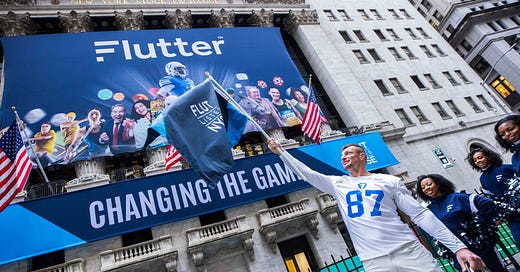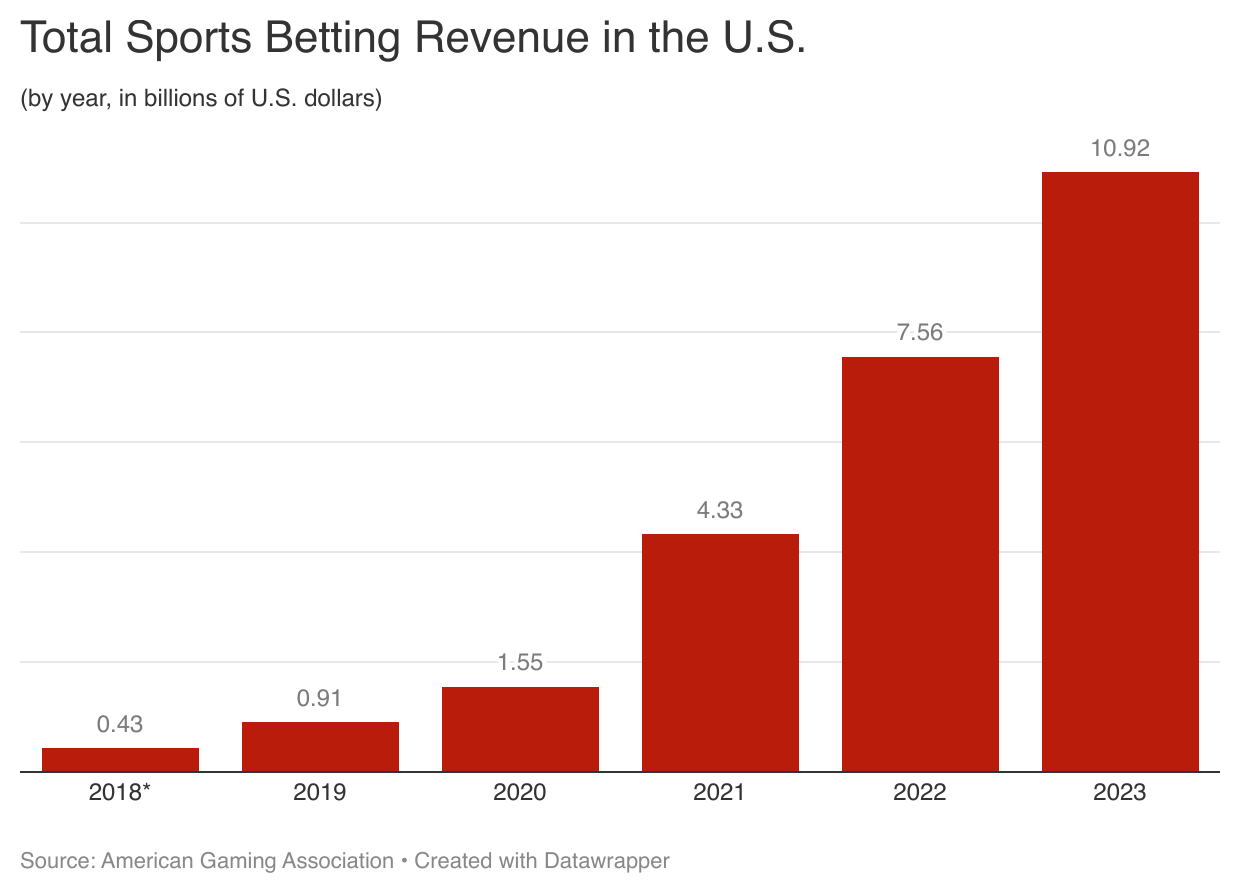Sports gambling is already a massive thing here in the U.S. We understand that with our eyes whenever we watch TV, or even when we’re just perusing the interwebs or driving by a billboard on the highway. It’s everywhere. It’s a (don’t) campaign supernova. In the sky.
That all-fronts marketing offensive powers (and is powered by) a rapidly growing industry. Annual revenues have soared roughly $10 billion in five years, and we’re still not at full adoption.
I think we can safely assume that 2024 will set another new record once that data’s available to us. North Carolina just became the 30th state to legalize sports betting on your phone, which online sportsbooks like DraftKings and FanDuel are especially concerned with bringing to the masses.
Check my math here, but I believe that means we’re still 20 states short of a full union. In the business pages — we’re the business pages today — we call that a growth runway.
On the flip side, most of you already know the ways in which this has been harmful. Competitive integrity, for one thing: the Shohei Ohtani scandal that wasn’t, followed by the actual scandal that was in the NBA, and now another in MLB. Will those continue as we move forward? Oh, most definitely.
I take that all seriously, but there’s a reason pro sports leagues aren’t backing off their deals with sportsbooks. That one’s easy. This has been a fruitful partnership for them.
Inventory sports like basketball and baseball are making the most of the lulls in their respective regular schedules1. When thousands upon thousands of people are betting on a meaningless Wizards-Hornets game in April, chances are that a good percentage end up watching it too to see if they can win. For the NBA, more eyeballs and more engagement are only a positive.
Meanwhile, true event sports like football are further eventizing each and every game by the same process. Steelers and Ravens fans are always going to watch a division clash. Between betting and fantasy football, though, an even higher percentage of non-rooting fans end up tuning in for that game. Take out all the moral/integrity considerations (which you can’t, of course, but bear with me) and you’re looking at a clear win for the leagues.
There’s another winner, who had to come to the table too in order to make this all work. That would be state legislators. The emergence of this industry, cosigned by dozens of states where it once seemed unthinkable, has come with a healthy bump in tax revenue. New York leads the way on this by far, collecting a staggering 51% on sports betting for three years now. That’s a lot of money.
I went through the Census Bureau data so you don’t have to, and these are the numbers. In Q4 2023, the most recent quarter for which we have data, New York made $260M off sports betting. That’s more than the $230M it made from taxing tobacco products. It’s way more than the $66M it made from taxing purchases of alcohol. That’s serious money we’re talking about as a direct result of choosing to legalize. In the investigative journalism pages — and since we’re downloading .csv’s from the Census Bureau, what we’re really investigating is my capacity for bureaucratic mundanity — we call that a motive.
Other states have taken note of this. None of them come near New York as yet, with Pennsylvania a distant second at $55M, and the rest of the top five — Ohio, Illinois, and Indiana (Midwest stand up) — all clustered in a similar range.
But Illinois, for one, is tired of playing catch-up. Just last week, state legislators passed a new progressive tax rate that will hit the biggest operators up for 40%. Prior to that, the top rate was 15%, so their bottom line is about to skyrocket.
These are the economics of vice in a nutshell, as attested by the sorts of products we’ve already mentioned, those being cigarettes and booze. If you’re gonna let people do this thing that you, Government, are well aware is bad for them and society, but they’re going to do anyways, then you might as well get a cut, right? Can’t let a good addictive substance/service go to waste. That’s just bad business.
My cynicism aside, the point is: states are cashing in on this ongoing revolution in sports entertainment, and that’s what this is. It’s a giant influx of new money into an industry that, like most industries, isn’t inclined to let growth pass them by. Could it backfire? Sure. It already is, in bits and pieces.
Just like the leagues themselves, which can’t control the legal picture anyways, states aren’t going to be hugely eager to crack down on sports betting either. Not as long as they’re getting their cut.
What’ll really be interesting is watching how companies like DraftKings and FanDuel go about profitably operating in New York under those onerous conditions. 51% is a lot. Is that something they’ll lobby to lower? Will that work, given what I laid out above?
It’s a funny phenomenon. The states are holding a lot of the cards here, and they sure seem like they like their hand. Expect another raise or two before this is through.
Also, This
🎰 Another week, another pro athlete given a lifetime ban for gambling on the sport he plays. This time, it’s Padres infielder Tucupita Marcano. Since it’s baseball, this conjures memories of scandals past, but it sure feels like we’re still nearer the start of this problem than the end. And nevertheless, they (sportsbooks/leagues) persisted.
📺 Looks like TNT is in fact going to lose streaming rights to the NBA, reports the Wall Street Journal this week (congrats on the exclusive btw). Barkley and co. might not be too crushed at the bidding war that will ensue between ESPN, NBC, and Amazon to draw them over to their network, though I maintain that this could end poorly for the viewers.
📖 I’ve been tearing through “The Breaks of the Game” by David Halberstram, partly out of a desire to better understand Bill Walton after his passing. I regret that I do this — I finally get around to reading this seminal book after he’s gone — but since I suspect I’m not alone in that, count this as a friendly nudge to give it a read. It’s about a great deal more than Walton, and it’s striking to see how much of today’s NBA discourse (the length of the schedule, the ravages of injury, the growing influence of star players, challenges of keeping a winning core together) was echoed close to verbatim over 40 years ago.
🗣️ Dan Hurley to the Lakers, eh? Not sure I see that. Not to profile here, but he just doesn’t strike me as someone who’d be eager to join the L.A. circus, setting aside the late-stage LeBron element of this that would make this job — in my opinion — a little less attractive. Far be it from me to tell Dan Hurley what to do though. He’d sure be good for a headline.
🏀 One game in, I’m feeling a little shaky about my Celtics pick. I wrote that line on Wednesday, aiming for a reverse jinx to support my stated convictions. So far, so good. That was a tough watch. To be clear, I picked them in seven (a coward’s pick), so there’s plenty of time here for me to be wrong.
🎙️ And one more time for anyone who missed the last newsletter — big honor to go on The Joe Pomp Show last week to talk about the college sports cataclysm, so please go and check that out if you haven’t:
Can’t take credit for this terminology, which I took from
and really like as a shorthand explanation for how those sports, and the viewing habits of their fans, inherently differ.





